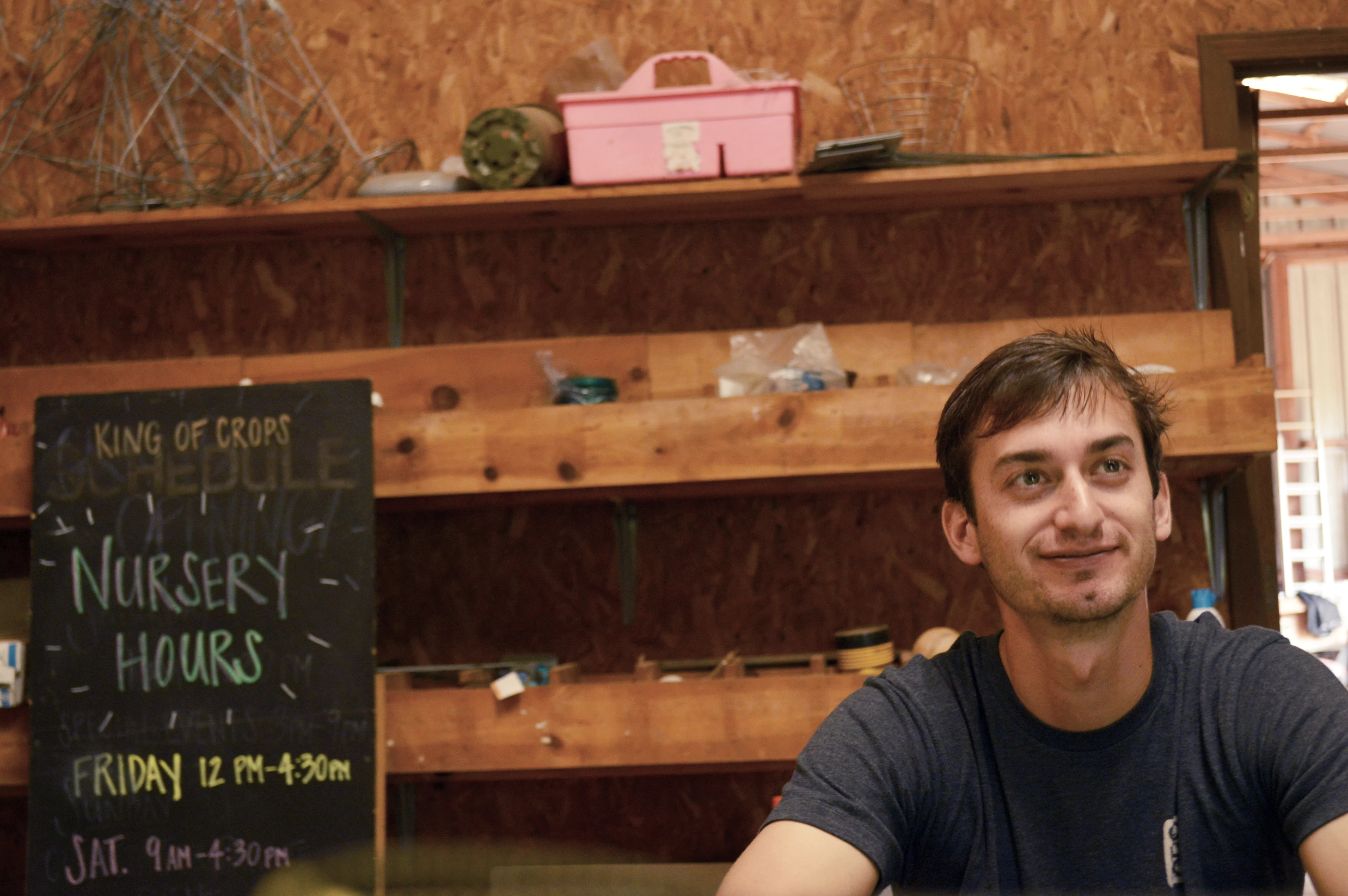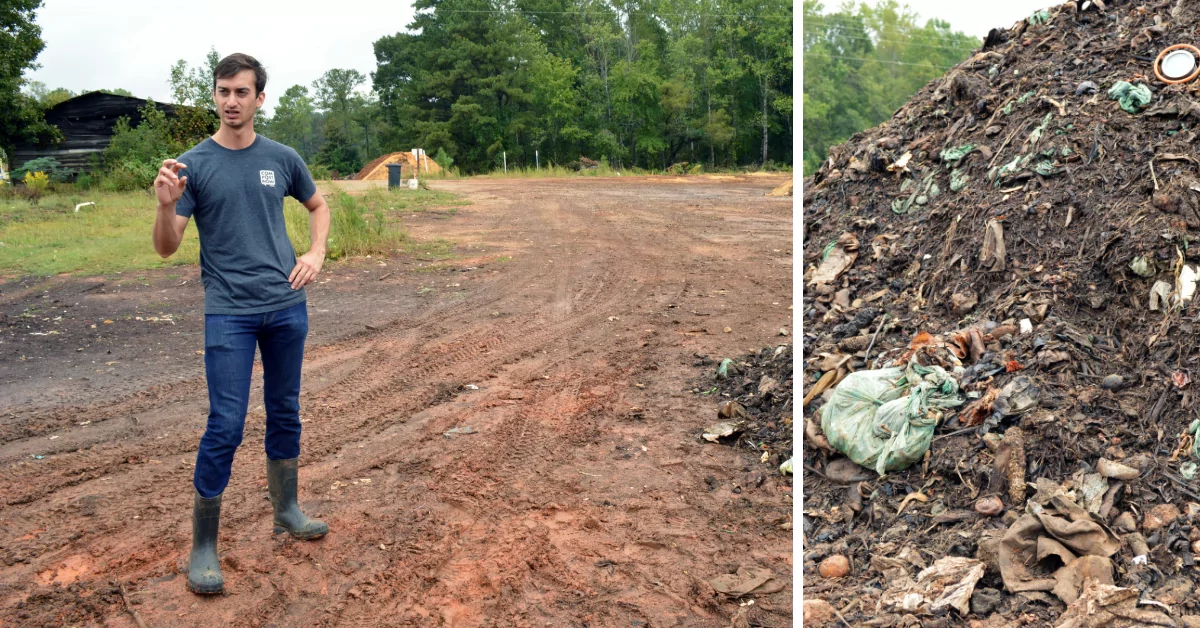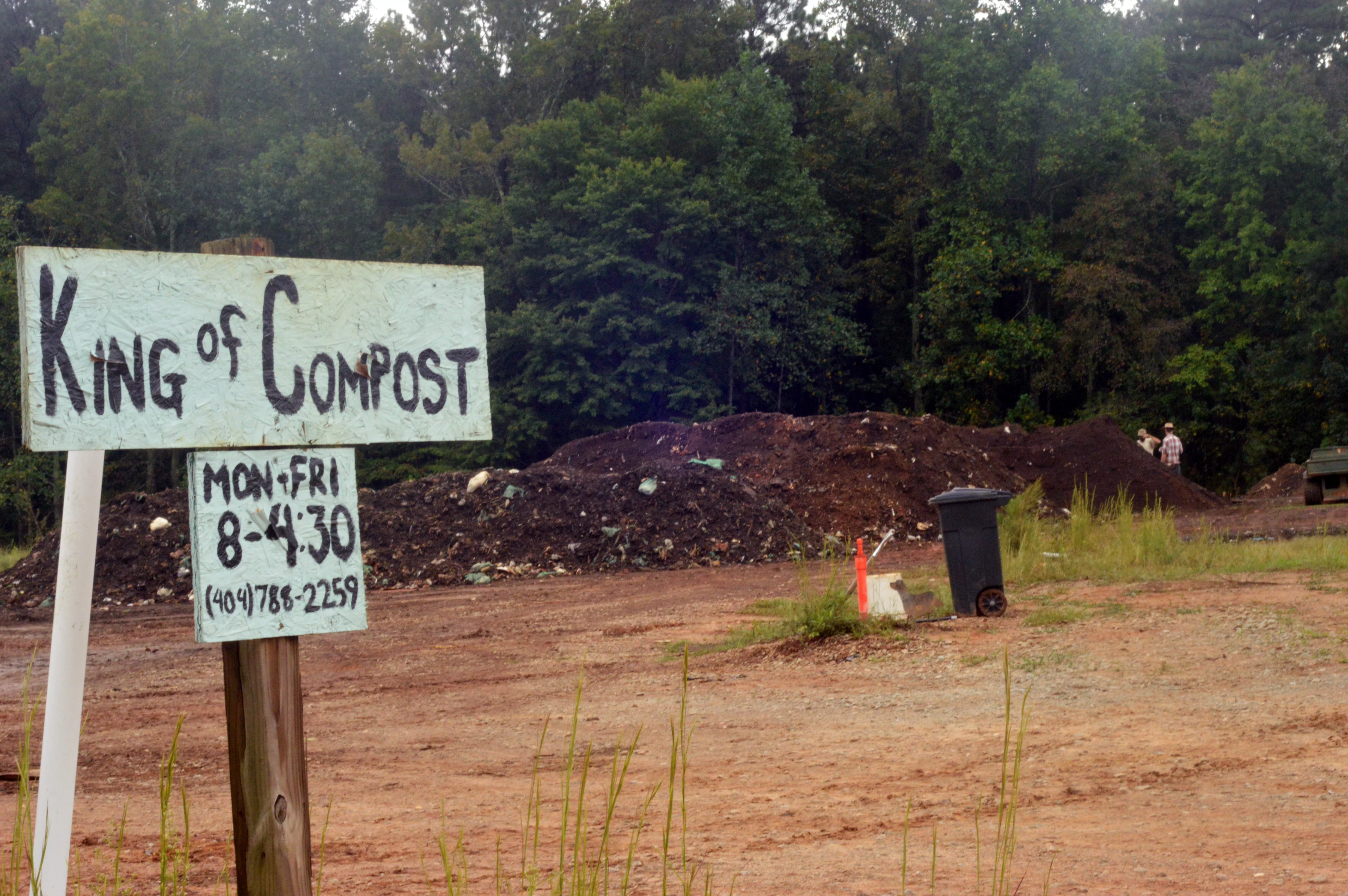The Science of Good Dirt at CompostNow
By Donna McDermott
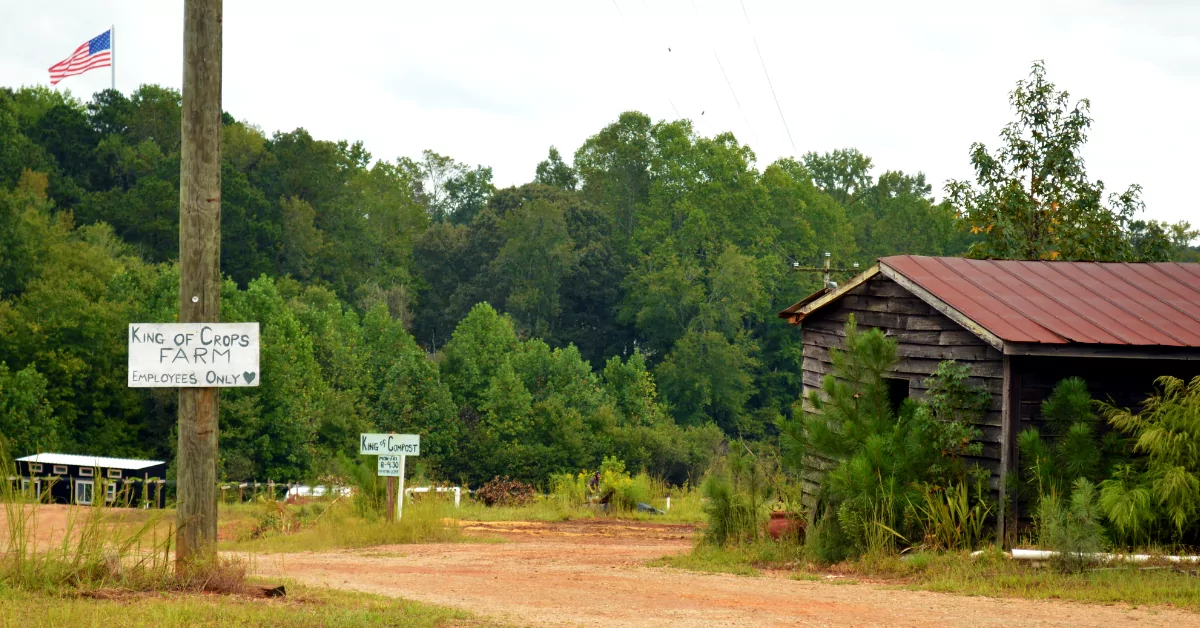
I visited King of Crops farm on the first cool morning of September. Last night’s rain had left a cloudy, golden glow over rows of blueberry, muscadine, and persimmon that would soon become popsicles sold under rainbow umbrellas. But I didn’t go to King of Crops for the fruit. I was there to meet David Paull, CompostNow co-founder and CIO.
About CompostNow
CompostNow collects food scraps from residents and businesses to help them reduce waste and support local gardens. The farm where I met Paull is less than an hour from Midtown, yet nature sprawled out around us with a vigor you rarely see in a city garden. In amongst the fields were tulip tree saplings, goldenrod blooms, and, of course, decay. This is the kind of decay that makes room for new growth.
David Paull, CompostNow co-founder and CIO
As we start our conversation, Paull speaks about his longtime commitment to agriculture that works in harmony with nature. These days, his goal with CompostNow is “to develop the vitality in our soil systems on a larger scale.” His goal of cultivating healthy gardens appears to have grown and flowered. Pokeberry branches fruiting around the skeleton of a long-abandoned greenhouse are one of the few signs that, years ago, this land was home to an ornamental nursery.
The compost piles are about as tall as I am, with dimensions slightly smaller than a school bus. The pile closest to the road is flecked with mysterious white and green streaks. Piles farther from the road are older, richer, and have become a uniform dark brown. As we walk toward the compost, I smell a slight, mellow funk. This is decomposition at work.
Piles and Piles of Compost
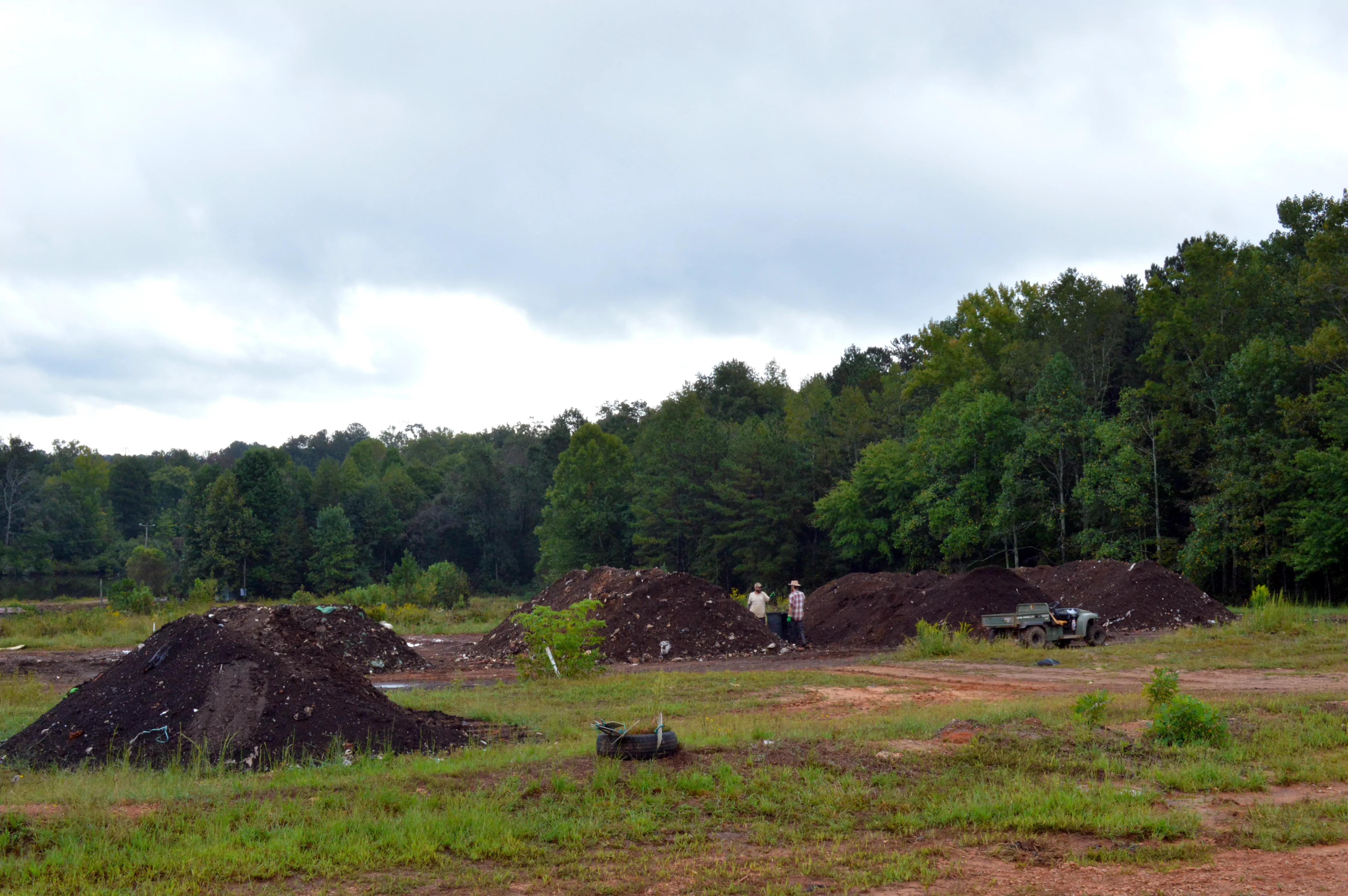
This isn’t just any dirt.
The labor of composting is largely here, right at the piles. Workers pick out trash that won’t decompose, filtering out the mistakes that sneak into composters’ buckets. (Or, maybe “mistakes” is the wrong word. Unusual finds in this compost pile include a life-size steel dog statue.) Once the piles are cleared of contaminants, microbes take over the work.
Microbes are organisms that are too small for the human eye to see. This group includes bacteria, small funguses, algae, and other single-celled creatures. And there is a diverse microbe community living in all healthy soil. This microbe community helps plants absorb soil nutrients and also decompose. Different species of microbes grow at different temperatures. Paull measures a pile where microbes are thriving at 136°, while a freshly turned pile would have microbes that work best around 150°. High temperatures like these are essential for safely composting materials like meat and dairy. In contrast, home compost piles are smaller and therefore colder, so meat and dairy products often can’t be included. In a colder compost pile, meat and dairy products don’t decompose all the way. Meat and dairy scraps breed different communities of microbes that can be harmful to human health. These differences in microbe community are why the small compost pile in someone’s backyard is likely to only contain raw vegetable scraps.
The Science of Good Dirt
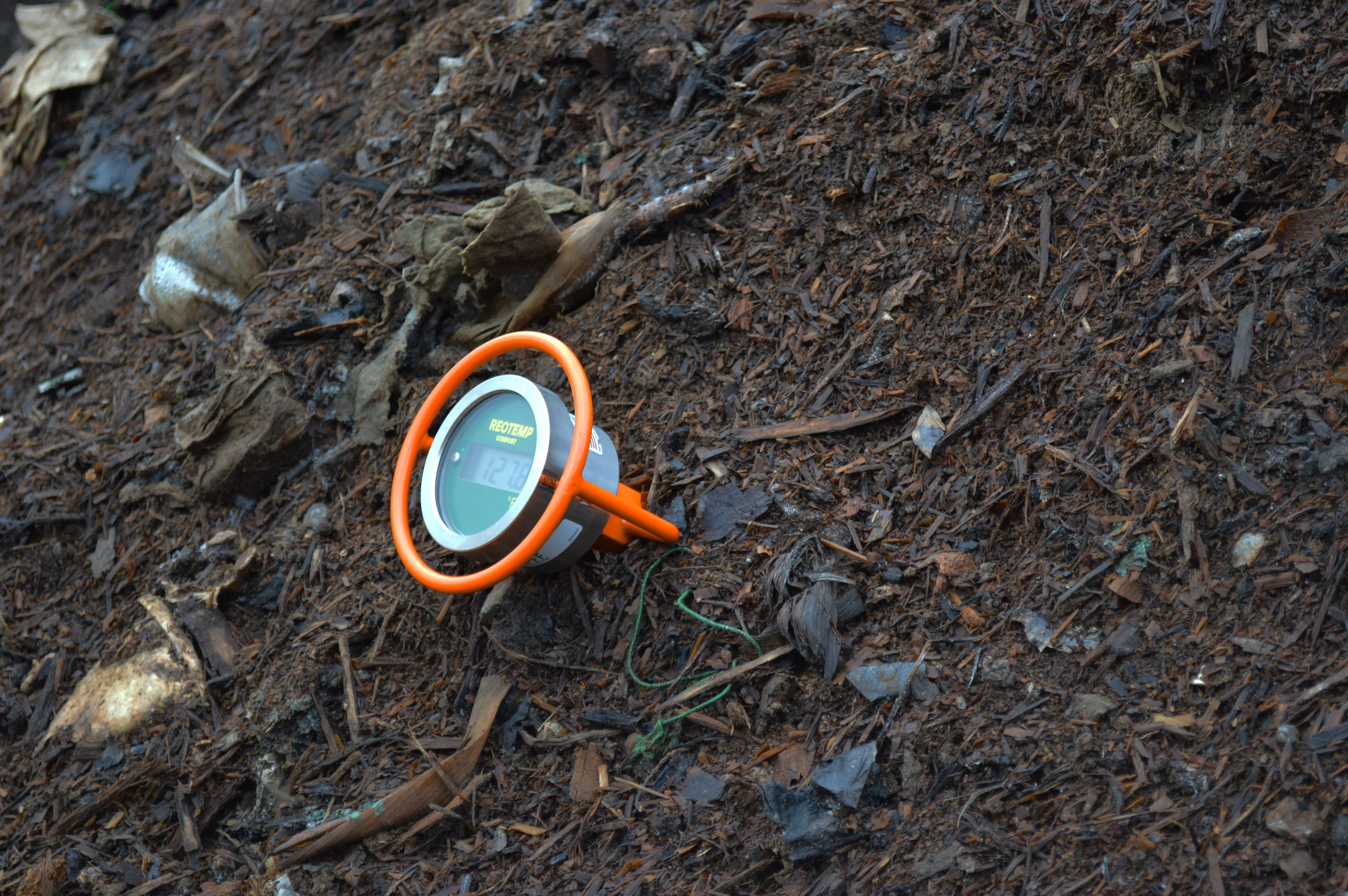
Monitoring the temperature of the compost pile.
CompostNow has the capacity for huge compost piles that are consistently maintained by skilled workers. Because these piles always reach high temperatures, consumers can safely include meat and dairy products in their CompostNow bins. The workers at CompostNow carefully control pile temperature by accounting for a range of factors: pile size, the frequency with which the piles are turned, airflow through the piles, water content. It’s this maintenance that makes composting so easy since customers don’t need to think about which foods are going into their CompostNow bin.
The microbe decomposers take their time in fully decomposing food scraps down into soil nutrients. These piles will mature for about nine months before they’re ready. Most of the compost here will stay on the King of Crops farm, helping to fertilize the soil that has long been neglected. CompostNow also sends compost to community gardens around Atlanta and to the customers that submit compost in the first place. Give out food scraps, receive soil nutrients in return. This process of rot and rejuvenation might not seem romantic, but compost piles are nature at its finest. Cycles of growth are regenerated here, by the slow, steady effort of humans and bacteria and fungi.
The Cost of Composting
The biggest challenge of composting is the stage where waiting isn’t an option: the very beginning. The logistics of moving food scraps from dinner plates to dump trucks are complicated. To solve this puzzle, CompostNow uses their own original software to create routes between composting customers while tracking data on the company’s collection and production. The customers are the fuel behind this operation. Customers’ food scraps generate nutrient-rich soil while their monthly fees support the staff that maintains healthy compost piles. Still, most customers never see the farm where their waste turns into new food. So why do customers sign up?
I signed up for CompostNow for the same reasons that David Paull began community composting in Atlanta in the first place. As Paull describes it, agriculture is “the basis of a healthy community.” But unfortunately, our mainstream agriculture system “goes totally against the way that we could be producing food and how we think about our waste in general.” Paull points out that it’s a problem to think of food scraps as waste, yet many people do; 97% of food scraps generated in the US are dumped in landfills and the US produces more than 100,000 tons of landfill waste annually. These tons of waste are costly.
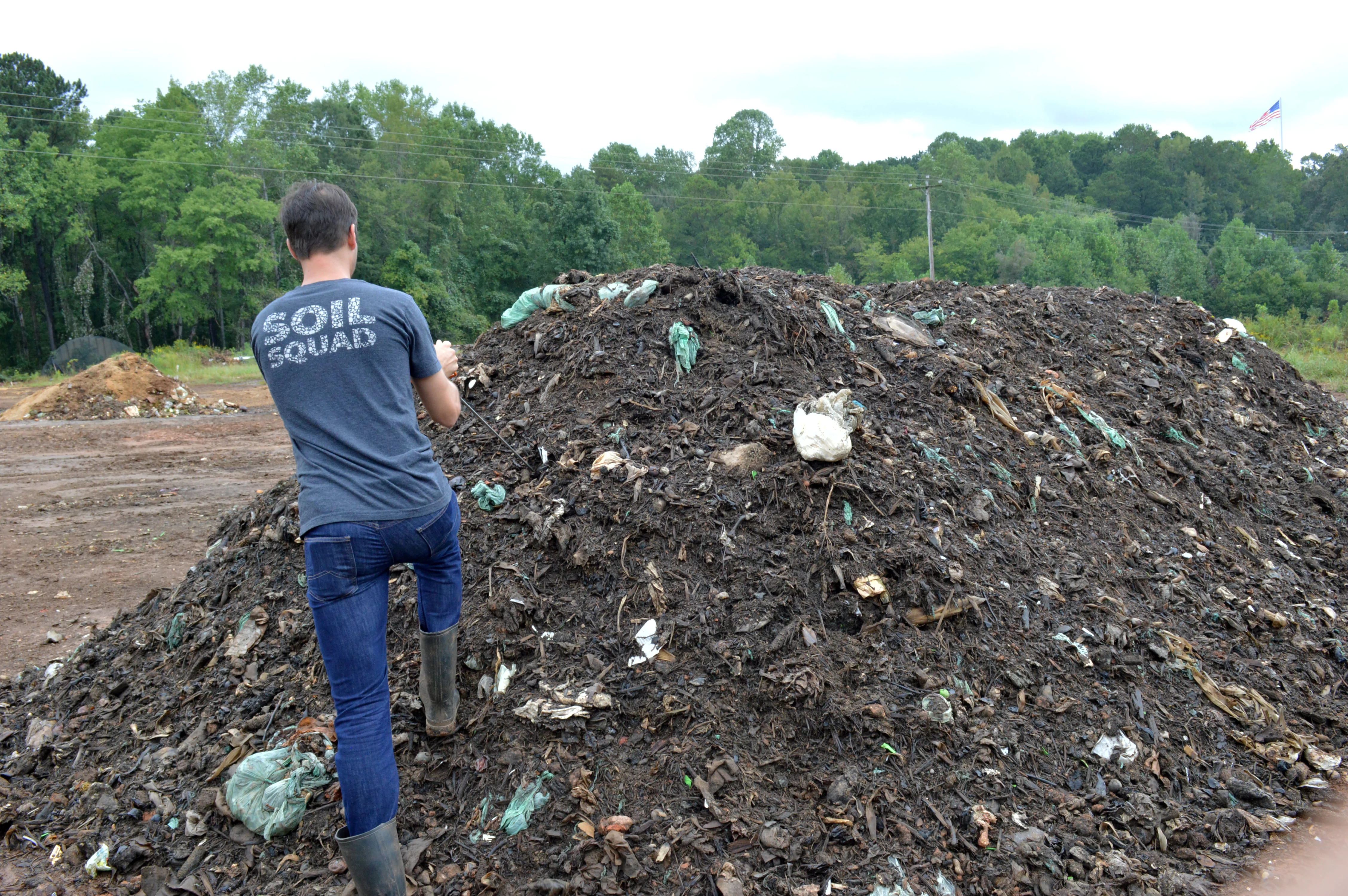
The cost of composting goes toward building a sustainable culture.
Paull explains that some potential customers balk at the price of monthly compost pickups. He argues that throwing food scraps in the trash can isn’t free, either. (In Atlanta, the base rate for garbage pickup is more than $300 per household each year.) The cost of conventional trash pick up is especially high if you consider the long-term costs. For example, Paull lists, “The cost to maintain those landfills, the cost of environmental degradation, the cost of, you know, the fact that our climate is changing rapidly. We’re experiencing more extreme weather conditions than we have ever before… So, if… you think that you don’t pay for waste, you absolutely pay for waste.” In Paull’s opinion, the cost of composting goes toward building a sustainable culture.
Sustainability is not just a matter of microbes and trash and dirt; it’s about people. For healthy ecosystems to thrive, the people inside them need to, also. At CompostNow, Paull explains, “People have to be able to have health insurance. They have to be able to go from being a college student… to someone that’s interested in developing a life with potentially a family.” This ethos is why CompostNow’s minimum wage is $15 an hour. This respect for workers is a heartening contrast from conventional trash pickup services. Though conventional trash collectors make a similar wage (median hourly wage in the US is $17/ hour), they risk injury and death in the collection process. Trash and recycling collection is one of the most dangerous jobs in the country, according to the US Bureau of Labor Statistics. In contrast, CompostNow’s commitment to the environment includes prioritizing the needs of people in their community, including both those on the farm and out in the world.
Community & Sustainability
Connecting with community members about sustainability is the foundation of CompostNow. Paull describes how exciting it is to host conversations with composters: “If we can stand at a farmer’s market and be the enthusiastic champions of compost, where someone can come up to our table and literally exclaim their passion for their backyard compost pile to us and just share that to us, that is an amazing opportunity and we treat that very seriously.”
Get Involved
Would you like to join in on the compost conversation? You can visit CompostNow online. If you’re extra excited — or extra tentative— you can talk to a CompostNow expert at the Grant Park Farmer’s Market, Peachtree Road Markets, or Freedom Farmers Market. Global ecosystems may be changing rapidly, but businesses like CompostNow are a nice reminder that there’s still time to connect to your environment. Don’t miss the opportunity to walk down tree-lined park paths early in the morning, hot coffee in hand, and ask a stranger what to do with your dirt.
Thank you to CompostNow and David Paull for walking us through the science of good dirt. Stay tuned to our website, Facebook, Twitter, and Instagram for more Awesome Science of Everyday Life features and other science updates!


